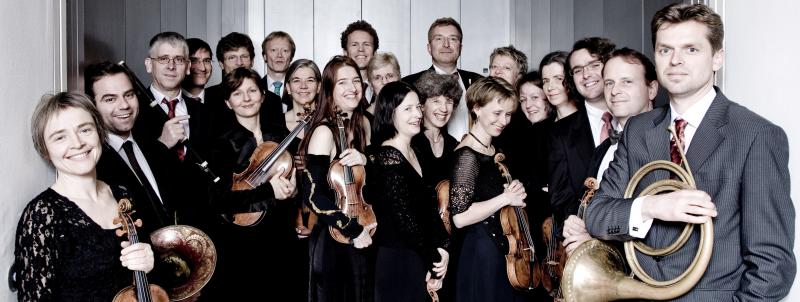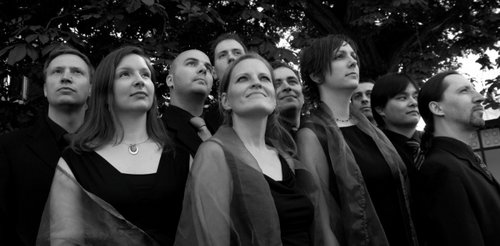Monteverdi Vespers, Vox Luminis, FBC, St John's Smith Square | reviews, news & interviews
Monteverdi Vespers, Vox Luminis, FBC, St John's Smith Square
Monteverdi Vespers, Vox Luminis, FBC, St John's Smith Square
Where was the vocal drama and the joy in Monteverdi's greatest sacred work?

On paper this was a knockout concert: Gramophone Award-winning Belgian ensemble Vox Luminis teaming up with the wonderfully gutsy Freiburg Baroque Consort to perform Monteverdi’s Vespers in the composer’s 450th anniversary year – one of the highlights of this year’s London Festival of Baroque Music.
It’s hard to know quite where the problem lay. Vocal forces of just 13 and an orchestra of similar numbers were never going to provide the choir-of-hundreds contrasts that can work so well in this music, nor should they have to. In their place you’d expect clarity of line, rhythmic freedom, expressive intimacy – a soloistic approach to music that, for all its sacred texts, has at least one foot in the opera house.
There was a lack of joy to the whole performance that was never fully supplemented by solemnity
What we got instead was a fairly undifferentiated choral sound, sustained uniformly across sensual Song of Solomon texts and dramatic psalms alike. Very few consonants survived the tricky St John’s Smith Square acoustic, and anyone unsure of the texts would have had only the faintest idea whether the choir were singing of love or war at any given moment. The solo style of the singers did vary more noticeably – from quasi-operatic tenorial plangency (not always reliably tuned) to strip-lit soprano lines that offered the severest take on Early Music whiteness and brightness. The Pulchra Es duet was schoolgirl-polite, despite music whose coiling ecstasy begs overtly for something a bit more adult.
 There was a lack of joy to the whole performance that was never fully supplemented by solemnity. Long pauses between movements (necessitated by stage choreography designed to reflect the composer’s ever-shifting and reconfiguring vocal forces) banished any hope of ritual continuity and flow of drama, and a refusal from the ensemble to engage with the inventive delight and technical bravura of the contrapuntal movements left us caught somewhere between sacred service and concert-hall. Directed informally from within the singers, tempi were safe and fairly uniform, and together with a dynamic that rarely strayed beyond mezzo-something the effect was just a bit wan.
There was a lack of joy to the whole performance that was never fully supplemented by solemnity. Long pauses between movements (necessitated by stage choreography designed to reflect the composer’s ever-shifting and reconfiguring vocal forces) banished any hope of ritual continuity and flow of drama, and a refusal from the ensemble to engage with the inventive delight and technical bravura of the contrapuntal movements left us caught somewhere between sacred service and concert-hall. Directed informally from within the singers, tempi were safe and fairly uniform, and together with a dynamic that rarely strayed beyond mezzo-something the effect was just a bit wan.
There were moments of excitement. The brusque attack of the “conquasabit” in the Dixit Dominus, a lovely dancing lilt at the opening of the Laudate Pueri, the poise of the Ave Maris Stella, passing between two choirs, and – above all – the playing of the instrumentalists of the Freiburg Baroque Consort. Cornetto lines punched boldly above the voices, winding themselves around one another in gloriously vulgar displays of virtuosity, while strings came to the fore in the Sonata, adding a grainy, contrapuntal interest to the soprano’s plainsong line.
Monteverdi’s Vespers remains a conundrum for musicologists. Is it a coherent work, or is it simply a resource-book of musical options? Some performances leave you certain of its cohesion, passionately convinced by the musical totality of this great work. This performance left me in doubt. Vox Luminis and Freiburg Baroque offered us a beautiful collection of musical fragments, but with little connection or dramatic arc. The glorious final Magnificat offered no sense of arrival, no sense of a larger musical narrative at work.
rating
Explore topics
Share this article
The future of Arts Journalism
You can stop theartsdesk.com closing!
We urgently need financing to survive. Our fundraising drive has thus far raised £49,000 but we need to reach £100,000 or we will be forced to close. Please contribute here: https://gofund.me/c3f6033d
And if you can forward this information to anyone who might assist, we’d be grateful.

Subscribe to theartsdesk.com
Thank you for continuing to read our work on theartsdesk.com. For unlimited access to every article in its entirety, including our archive of more than 15,000 pieces, we're asking for £5 per month or £40 per year. We feel it's a very good deal, and hope you do too.
To take a subscription now simply click here.
And if you're looking for that extra gift for a friend or family member, why not treat them to a theartsdesk.com gift subscription?
more Classical music
 Weilerstein, NYO2, Payare / Dueñas, Malofeev, Edinburgh International Festival 2025 review - youthful energy and emotional intensity
Big-boned Prokofiev and Shostakovich, cacophonous López, plus intense violin/piano duo
Weilerstein, NYO2, Payare / Dueñas, Malofeev, Edinburgh International Festival 2025 review - youthful energy and emotional intensity
Big-boned Prokofiev and Shostakovich, cacophonous López, plus intense violin/piano duo
 theartsdesk at the Three Choirs Festival - Passion in the Cathedral
Cantatas new and old, slate quarries to Calvary
theartsdesk at the Three Choirs Festival - Passion in the Cathedral
Cantatas new and old, slate quarries to Calvary
 BBC Proms: Estonian Philharmonic Chamber Choir, Kaljuste review - Arvo Pärt 90th birthday tribute
Stillness and contemplation characterise this well sung late-nighter
BBC Proms: Estonian Philharmonic Chamber Choir, Kaljuste review - Arvo Pärt 90th birthday tribute
Stillness and contemplation characterise this well sung late-nighter
 BBC Proms: Kholodenko, BBCNOW, Otaka review - exhilarating Lutosławski, underwhelming Rachmaninov
Polish composers to the fore in veteran conductor’s farewell
BBC Proms: Kholodenko, BBCNOW, Otaka review - exhilarating Lutosławski, underwhelming Rachmaninov
Polish composers to the fore in veteran conductor’s farewell
 theartsdesk at the Pärnu Music Festival 2025 - Arvo Pärt at 90 flanked by lightness and warmth
Paavo Järvi’s Estonian Festival Orchestra still casts its familiar spell
theartsdesk at the Pärnu Music Festival 2025 - Arvo Pärt at 90 flanked by lightness and warmth
Paavo Järvi’s Estonian Festival Orchestra still casts its familiar spell
 BBC Proms: Batsashvili, BBC Scottish Symphony Orchestra, Ryan Wigglesworth review - grief and glory
Subdued Mozart yields to blazing Bruckner
BBC Proms: Batsashvili, BBC Scottish Symphony Orchestra, Ryan Wigglesworth review - grief and glory
Subdued Mozart yields to blazing Bruckner
 Classical CDs: Hens, Hamburg and handmaids
An unsung French conductor boxed up, plus Argentinian string quartets and baroque keyboard music
Classical CDs: Hens, Hamburg and handmaids
An unsung French conductor boxed up, plus Argentinian string quartets and baroque keyboard music
 BBC Proms: McCarthy, Bournemouth SO, Wigglesworth review - spring-heeled variety
A Ravel concerto and a Walton symphony with depth but huge entertainment value
BBC Proms: McCarthy, Bournemouth SO, Wigglesworth review - spring-heeled variety
A Ravel concerto and a Walton symphony with depth but huge entertainment value
 BBC Proms: First Night, Batiashvili, BBCSO, Oramo review - glorious Vaughan Williams
Spirited festival opener is crowned with little-heard choral epic
BBC Proms: First Night, Batiashvili, BBCSO, Oramo review - glorious Vaughan Williams
Spirited festival opener is crowned with little-heard choral epic
 Interview: Quinteto Astor Piazzolla on playing in London and why Mick Jagger's a fan
Music Director Julián Vat and pianist Matias Feigin compare notes on Piazzolla
Interview: Quinteto Astor Piazzolla on playing in London and why Mick Jagger's a fan
Music Director Julián Vat and pianist Matias Feigin compare notes on Piazzolla
 Classical CDs: Bells, birdsong and braggadocio
British contemporary music, percussive piano concertos and a talented baritone sings Mozart
Classical CDs: Bells, birdsong and braggadocio
British contemporary music, percussive piano concertos and a talented baritone sings Mozart

Add comment